Organic Coffee in the UK - What's behind the increasing consumer demand for buying organic?
Not everyone understands why buying organic coffee in the UK is important. At the same time, many people clearly do! And as a result of your own interest, you’ve found Owens Coffee's organic coffee product range as a direct result of your own interest.
We’ve put together the article below to help explain the significance of how buying organic coffee in the UK can make a real difference; not just here, but in countries right across the other side of the world too!
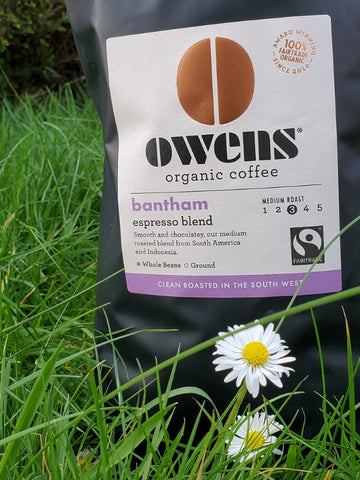
As a global commodity, coffee has a major impact
If you are a serious coffee drinker, it may come as no surprise to discover that coffee is THE most popular drink in the world1. In the UK, around 98 million cups of coffee are drunk every day1!
Said to be the world’s second most important export commodity after crude oil2, the production and process of getting coffee from plantation to cup places a huge impact on economies, the planet and the consumer.
With such a significant global impact, at Owens, we believe that we have a responsibility to ensure that those effects are as positive as they can be. That’s why all of the coffee we produce is certified organic and Fairtrade. Here are just some of the reasons why:
Organic coffee beans: The conscious choice
For the conscious consumer, there are three mindful reasons for choosing to drink organic coffee and to buy organic coffee beans:
- Supporting coffee farmers
Almost all organic coffee farm plantations will also be Fairtrade compliant. Fairtrade coffee supports the people who grow coffee beans by ensuring a fair price is paid to them for their products, by investing in their processes and communities and by monitoring standards for good working conditions. If you’d like to know more, we wrote an article about Fairtrade coffee beans.
Also related to conditions for workers: organic coffee farming means no synthetic pesticides, which means plantation workers aren’t breathing in these harmful chemicals.
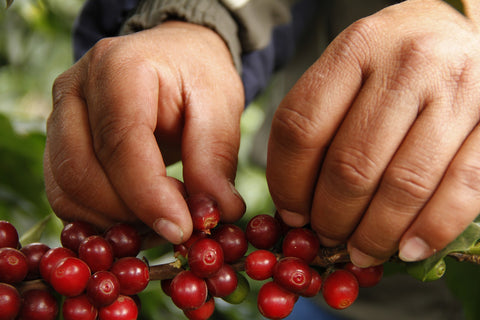
- Supporting the planet
Organic coffee farming methods are sustainable and help to protect the environment. Organic coffee is cultivated in shade-grown conditions. In terms of coffee production however, ‘sun-cultivated’ coffee produces the highest yield and therefore offers the greatest financial rewards to those involved in the chain. Worldwide demand is so high for coffee that coffee farmers have been encouraged to adopt this method. The consequence of creating large, sun-cultivated plantations is deforestation.
Forests stablise ecosystems. They do this by “storing water, circulating soil nutrients storing water, protecting soil, circulating soil nutrients, reducing temperature, balancing micro-climates, purifying air, housing countless animal and plant species and enriching biodiversity”3.
Buying certified organic coffee beans, means that the plantation the beans are produced by is using shade-grown farming methods and this reduces deforestation caused by the coffee industry.
In addition to the above, organic farming methods contribute to the conservation of soil and water resources in locations where drought is regular and commonplace4.
- Organic coffee beans are grown without the use of synthetic fertilisers, pesticides or herbicides. In regular coffee production (i.e. non-organic), these products are used in the coffee growing process. This can mean that when there is heavy rainfall, the chemicals wash into rivers and streams and can be redistributed, causing pollution in surrounding areas.
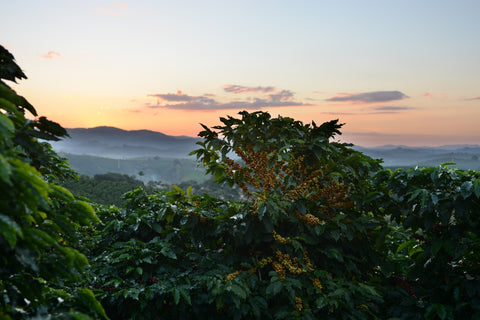
Organic Coffee Beans: Provenance
According to the Soil Association5, consumers are increasingly concerned with provenance. Where our food/drink comes from and exactly what is in it, is important to many of you.
As a consumer who is looking for high quality, as well as products you can trust, labelling has been and can be confusing. Certified organic coffee gives you reassurance and peace of mind as to the origin and supply chain behind the beans. So much so, we can even put names to the faces of the producers/co-operative managers of our organic coffee beans…
The Romero family farming coffee cooperative, Honduras
As an example, our speciality grade, single estate coffee ‘Romero’ is grown by the Romero family in Copan, Honduras.
Farmer, Deybi Omar Romero is the son of Jesus Romero, who is a founding partner of the Capucas cooperative ‘COCFCAL’.
Debyi works alongside his mother, María Julia Albertina Moreno.
We have a direct link to Debyi who produces a micro lot of premium grade coffee for Owens Coffee. In turn, our continued support for the cooperative has given the farm improved opportunities to develop its farming methods.
Coffee production is shade-grown and coffee varieties include caturra, parainema and catimor. The farm has diversified to include growing citrus, mango, cedar, Inga and bananas. Pulp is used as fertilisers on the land and mucilage is deposited by methods which avoid contamination of water sources.
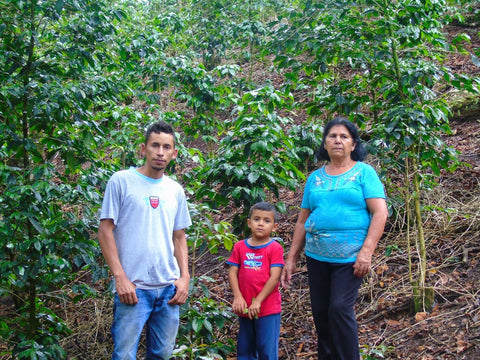
Debyi Romero, coffee producer, with his family, Honduras
Are Organic Coffee Beans Healthier Than Regular Coffee Beans?
The roasting process should be sufficient to remove any nasty chemicals found in non-organic coffee beans. However, because non-organic coffee is grown in soil which is effectively polluted by synthetic fertilisers, pesticides/herbicides, the natural minerals usually found in the soil that non organic coffee beans are grown is depleted. It follows that this is generally associated with a depletion in minerals, vitamins and antioxidants found in produce, and coffee is a product which should generally be high in antioxidants6.
Do Organic Coffee Beans Taste Better than Non-Organic Coffee Beans?
In theory, organic coffee beans should taste better than regular coffee. The reason is that organic coffee is shade-grown, the beans therefore grow more slowly and develop a deeper flavour. If you take into account that organic farming means less nasty chemicals too, that should contribute to an all-round, cleaner, stronger, richer taste.
Practically, our customers tell us that our organic coffees taste better than regular coffee. Try Owens Coffee for yourself and let us know what you think!
If you aren't sure where to start, we recommend Gara, our house blend which has been awarded the UK's Best Organic Coffee by the Soil Association at their Boom Awards 2019.
How can a coffee be organic but not be certified organic?
We’ve mentioned that certification benefits consumers in terms of a product’s provenance.
Please note however, that not all organic coffees are certified organic. Certification guarantees that the product has been approved by an independent organisation at every stage of production and has met those standards required to class it as being certified. That means not only are the farmers of our organic coffee beans monitored as well as the distribution network, here at the Roastery, we are regularly inspected. Certified organic coffee beans therefore offer full transparency, start to finish.
Is certification important? That can only be down to whether that level of transparency is important to you.
Organic Coffee Certification: The Soil Association
Our organic status is certified by the UK’s Soil Association. The Soil Association is a well-established and recognised charity which has (over many years since its formation in 1946) grown to become the UK’s leading membership charity that campaigns for healthy, humane, sustainable food, farming and use of land.
Amongst other categories, the organisation operates a set of standards for organic food and drink as part of its certification process, which is what businesses offering certified organic products are measured against.
Only businesses selling certified organic products have authority to use the Soil Association logo:
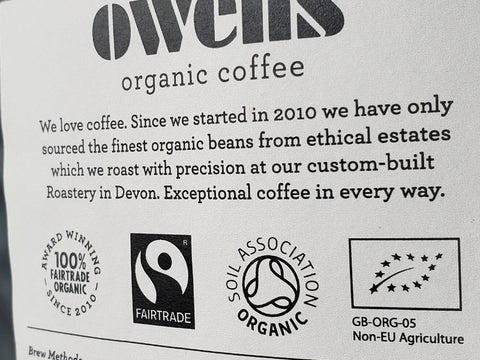
Growth of organic coffee market in food service
Many of our customers are in food service, selling our coffee to their own customers. According to the Soil Association Organic Market Report 2019, sales of organic into food service have increased steadily since 2013, rising by 7.8% for the year 2017-2018.
The Association believes that there is still significant potential to grow this area and expect growth to continue. In its 2018 Eating Out Survey, the Soil Association found that ‘half of people would be more likely to choose a restaurant that highlights ethical or sustainable credentials’. It also found that ‘over 2 in 5 (43%) think a restaurant will be better than others if they see organic on the menu or drinks list’ and that ‘47% agreed there aren’t enough restaurants that serve ethically or sustainably sourced dishes'.
And when the pandemic hit in 2020, this only increased spend on organic products and produce, with customers spending over £50 million a week on organic products.
If you are a food service provider whose spend on organic is more than 15%, your business would be eligible to apply for a Soil Association ‘Organic Served Here Award’.
If you’re a food service business looking for a wholesale coffee supplier with a 100% organic coffee range, contact the Owens Coffee team.
Buy organic coffee online in the UK
Owens Coffee’s online store offers a range of 100% certified organic coffee beans, as well as a range of our favourite home brewing equipment, with delivery throughout the UK.
References:
1 - https://www.britishcoffeeassociation.org/coffee-in-the-uk/coffee-facts
2 - https://markets.businessinsider.com/commodities/coffee-price
3 – Extract: http://www.hrnstiftung.org/coffee-and-deforestation/
4 - https://academic.oup.com/bioscience/article/55/7/573/306755
5 – Soil Association Organic Market Report 2019
6 - https://www.ncbi.nlm.nih.gov/pmc/articles/PMC2841576/


